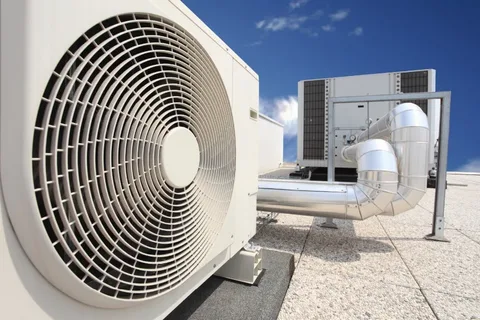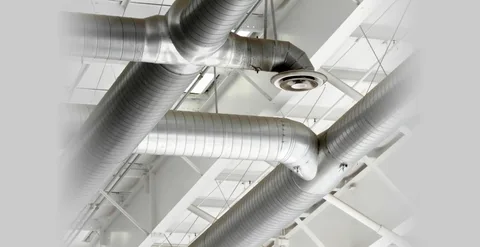Home ventilation is essential to maintaining a safe, healthy, and comfortable living environment. It helps reduce airborne pollutants, improve air circulation, and regulate your home’s temperature. With the help of ventilation, you can be sure that you and your family breathe clean, fresh air. Ventilation can be incredibly beneficial for your health and well-being. With the proper system, your home will be filled with clean, fresh air free from allergens, pollutants, and other contaminants. Not only will you be breathing more accessible, but a ventilation system can help keep your home comfortable and energy efficient.
Home Ventilation Removes Contaminants From The Air
One of the most essential benefits of home ventilation is that it helps remove harmful contaminants from the air. In modern homes, it’s exposure to airborne contaminants such as dust, dirt, smoke, mould spores, and other pollutant is easy. While these particles are typically too small for us to see with the naked eye, they can still hurt your health.
Home ventilation helps reduce these contaminants by improving air circulation and removing them through filtration. It helps to keep indoor air free of pollutants and, in turn, can help improve your overall health and well-being. In addition, good ventilation can also help reduce the accumulation of mould and mildew inside your home, which can be a common cause of allergies and other respiratory ailments. Ensuring proper ventilation and airflow can help ensure that moisture buildup doesn’t occur, keeping your living space cleaner and more comfortable.
Furthermore, using ventilation helps you save money on energy bills. Installing an efficient model can bring fresh air into your home while reducing the energy used to heat or cool it. It saves you money each month and contributes positively to the environment by reducing your carbon footprint.
Finally, having efficient home ventilation will also extend the life of specific components within your home. By removing excess moisture from the air, you can prevent rusting and corrosion of various appliances, fixtures, furniture pieces, and other items within your house. It means those items will last longer, saving you money over time.
A Home Ventilation System Can Improve Your Indoor Air Quality
The air inside your home can contain contaminants from indoor sources such as cooking, cleaning products, and pet dander. These pollutants can build up in the air, making breathing unhealthy. Using a ventilation system can help reduce the concentration of these pollutants in your home. Home ventilation system helps remove stale air and replace it with fresh outdoor air. It helps improve indoor air quality by reducing the amount of dust and other particles in the air.
Home ventilation also helps to improve humidity levels in your home. High humidity levels can encourage mould growth and other allergens, leading to respiratory illnesses. By removing moisture-laden air and replacing it with drier, outside air, ventilation can help reduce the risk of mould growth and other airborne allergies.
Ventilation also helps reduce odours and fumes that can build up in your home. Odours from cooking and cleaning products can be trapped indoors if not adequately ventilated. Installing ventilation can help reduce these odours and improve your indoor air quality.
Home Ventilation Can Help Reduce Your Energy Consumption
Having home ventilation can help to reduce your energy consumption. Properly installed and functioning ventilation can help to circulate air throughout your home, removing stale air and bringing in fresh air. You can save money on your energy bill by reducing the time your heater and air conditioner have to run.
Having a a proper home ventilation in place will also help to prevent moisture build-up, which can cause a wide range of problems, such as mould and mildew. It will also help keep humidity levels in check, making it easier to control your home’s temperature. When your home’s temperature is well regulated, it takes less energy to heat or cool it, saving you money on your energy bills.
Finally, ventilation can help improve the air quality in your home by filtering out pollutants, dust, pollen, and other allergens. It can not only improve your overall health but also reduce the amount of energy that is needed to clean the air in your home.
You can benefit from improved indoor air quality and reduced energy costs by having good ventilation in place. Not only will this make your home more comfortable, but it will also help to protect your health and save you money on energy costs.
 Ventilation Can Help You Save Money On Your Heating And Cooling Costs
Ventilation Can Help You Save Money On Your Heating And Cooling Costs
If you’re looking to lower your energy costs, ventilation can help. Ventilation helps move heated air away from living areas, reducing the load on your heating and cooling system. It means you won’t have to spend as much on energy bills to heat or cool your home. Additionally, ventilation helps remove moisture from the air, improving your home’s overall energy efficiency and reducing the strain on your HVAC system.
In addition, a well-ventilated home can help maintain a consistent indoor temperature. It reduces the need to constantly adjust the thermostat to keep your house comfortable. By using ventilation to regulate the temperature in your home, you can save money on both your cooling and heating bills.
Finally, by removing excess moisture and pollutants from the air, ventilation can also reduce wear and tear on your heating and cooling system. It means that you may be able to extend the life of your system, saving you money on replacement costs.
Ventilation Can Improve Your Overall Health
Having ventilation installed in your home can benefit your overall health. Ventilation can be designed to filter out and remove indoor air contaminants such as dust, pollen, smoke, and other allergens. It helps to keep your air clean and reduces the risk of allergies, asthma, and other respiratory illnesses.
Furthermore, having ventilation will reduce the amount of humidity in your home. Excess moisture can lead to mould growth and the spread of bacteria, which can cause health issues. Ventilation will help maintain a healthy humidity level in your home and help you avoid these potential risks. Finally, having ventilation in your home can also help improve your mental health. Poor air quality can lead to headaches, fatigue, and irritability. Ventilation can help enhance the quality of air and make your living environment more comfortable and enjoyable.
Additionally, it can create a more peaceful atmosphere by reducing outdoor noise levels. Installing a ventilation also means improved energy efficiency in your home. As air is circulated throughout your house, less energy is used to heat or cool it down. It will save money on your utility bills and contribute to a greener household.
Conclusion
Installing home ventilation can benefit your health, energy consumption, and pocketbook. By removing contaminants from the air and improving indoor air quality, you can enjoy a healthier and cleaner living environment. Additionally, ventilation can help reduce your energy bills and improve the efficiency of your heating and cooling systems. Investing in home ventilation is a great way to improve your overall health and save money on your utility bills.
Related Websites:
Articles on Blogshunt
Articles on tbablogs
Articles on Blogspeoples
Articles on Thebigblogtheory
Articles on Allcityforums


